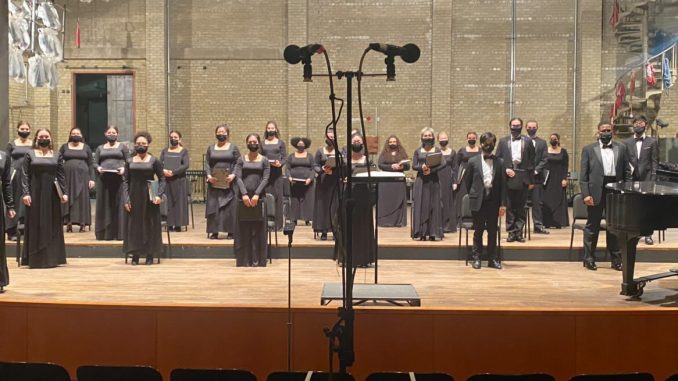
By Aliyah Jacobson
On Nov. 17, the Brooklyn College Symphonic Choir performed its final concert of the semester with an in-person audience. The Conservatory of Music started allowing Brooklyn College members with proof of vaccination to be part of an audience for conservatory shows after they canceled their live stream option.
Upon entering the Claire Tow Theater, the choir performed movements of “Handel’s Messiah” and Margaret Bonds’ “Simon Bore the Cross.” Even though they were restricted by masks and social distancing, it was a thrilling sight to see the choir on the stage again, a reminder that in the post-COVID world, artists can have a role or voice.
The women singers performed in their matching concert gowns and the men wore tuxedos with their singer’s masks, hair pulled back, and no jewelry present, per the rules. They were led by the Conservatory Director Malcolm J. Merriweather, who gave introductions to the various pieces.
Their next and final piece was sobering and moving, focusing on the life and lynching of Matthew Shepard, a gay college student in Wyoming, titled “Considering Matthew Shepard.” The work was originally written by Craig Hella Johnson inspired by Shepard, who was murdered as part of a hate crime in Wisconsin in 1998.
Merriweather reminded those in the audience of the violence that so many in the LGBT community face, and how though we may have come a long way in the passing of equal rights in this country and around the world, there is still a long way to go. The narrator, a member of the conservatory singers, shared towards the end of the piece how this incident, along with others, prompted former President Barack Obama to sign “The Matthew Shepard and James Byrd, Jr. Hate Crime Prevention Act” eleven years after Shepard’s death. The act expanded existing federal hate crime law to include crimes motivated by the victim’s sexual orientation, gender, identity or disability.
Of the various movements in the piece, one was the voice of Shepard’s mother calling to her son; one was of Shepard himself with excerpts from his journal; and one was a haunting jazz melody titled “Get Away from Me” sung by Chen Philips, an Israeli vocal singer. One of the lyrics repeated many times was “Stay out of my heart, stay out of my hope,” and Chen reflected on these words saying that she channeled her Holocaust survivor grandparents who prayed that those who hated them and were conspiring to wipe out their race would be kept away from them.
The movement ended when Merriweather shared that Matthew Shepard’s parents, in fear of his grave being desecrated, held on to his ashes for twenty years. In 2018, through a moving tribute, Shepard was finally laid to rest at the National Cathedral in Washington D.C. At this time, those on the stage and in the audience had tears in their eyes and a sense of the gravity of the words and performance that then erupted in a standing ovation.
“This is important to me that college students understand about this so that it never happens again,” said Merriweather in regards to performing the sobering piece on Matthew Shepard. “Performing this piece is an emotional roller coaster.”
